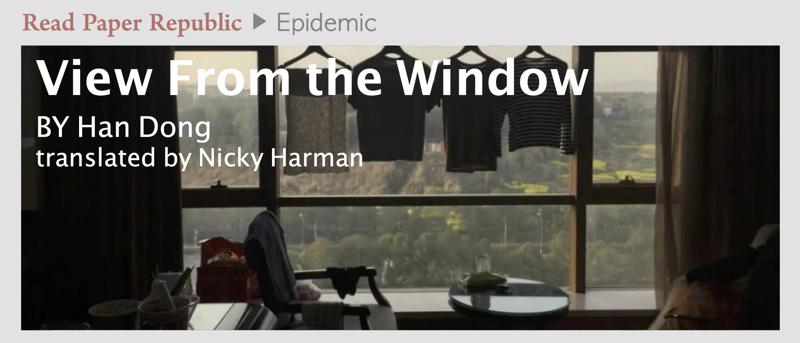I have never spent twenty-four hours a day cooped up with someone in a room less than thirty square meters (if you don’t count the bathroom), for sixty days without a break. Until 21st January, 2020. My wife and I went to Hubei to spend Chinese New Year with her family, the Covid19 pandemic broke out, cities were put under lockdown, and we were immediately quarantined in our hotel room.
In Buddhism, one of the eight sufferings is being forced to coexist with those we detest or despise. My feeling is that it works the other way around: you can grow to detest someone precisely because you are forced into a cramped space with them over a long period of time, especially when they are your nearest and dearest. Usually, when couples quarrel, one of them can slam out of the house, or say politely, “I want to be alone, give me some peace and quiet.” But there was no possibility of that for us. There were guards with red armbands outside our door, and even if you could break out through the window, it would be no fun to fall from eight stories up.
In a relationship, it’s pretty important to establish mental and emotional boundaries, and not invade someone’s personal space. Our sixty days of confinement made unprecedented demands on my wife and me. We needed good sense, self-restraint, and give-and-take, in spades. I’m happy to say that we were exemplars of connubial harmony. And we found ourselves becoming close in another way too – we were prison buddies.
We were lucky in that our room had a south-facing window which took up almost all of one wall. The window only opened a crack, but all the same, we had a magnificent view. Immediately outside the window was the main entrance of the hotel. The highway ran past, and beyond that, there was a construction site and farmland. Further off, we could see factory and residential buildings and, on the horizon, a line of mountains. Nothing stirred – no people, no cars, not even a breath of wind. Only a few stray dogs swaggered along the highway as if they owned it. Another time I saw two farmers at work in a field far in the distance. I was filled with astonished admiration. They must have been ancients, or immortals; the lockdown that kept the rest of us indoors clearly did not apply to them.
It was not only we who had a view of nothing, day after day. The view from everyone’s windows must have been the same in every city, town and village in China – vast, clean emptiness and not a soul to be seen – if the photos and videos I’ve seen on the internet are anything to go by. It put me in mind of Zhuge Liang and his Empty Fort Stratagem. But this was no wily military ruse, this was real. The entire country had emptied, as a phantom virus swept inexorably by outside.
The most difficult things for me personally were, firstly, that I couldn’t smoke – it was not a large room and we kept the fan off to prevent the virus spreading through the air-conditioning unit – and secondly, I was unable to write. I was just not in the mood. So in one fell swoop, I was doubly bereft. I spent the time scrolling through news pages on my phone, or picking at the meals that the hotel delivered to our door three times a day. We had our temperatures taken every morning and evening. Supposedly, if the readings were normal for fourteen consecutive days, that was proof that we were in good health, but three fortnights passed by, and we were still having our temperatures taken. Weirdly enough, my wife and I actually appreciated it; the daily routine was quite soothing. As the days passed, our sense of time altered, although it was hard to say if it was going faster or slower. On the one hand, time went faster because although nothing new happened, all of a sudden one more day had passed. But time slowed down too, because we had no way of telling when our confinement would end. The wait was awful. When would it be over? So the days sped by because they had a beginning and an end, and yet they crawled, because there was no end in sight.
One day, my wife told me that the oil-seed rape was in flower in the fields outside the window. And there it was, a brilliant expanse of yellow! Winter had turned into spring. Another day passed, and that evening when I was meditating, I heard the whine of a mosquito. It can’t be, I thought, it must be a fly. But the next morning, my wife told me that the mosquitoes had kept her awake all night, and she was covered in bites. March had arrived, and with it, mosquitoes. They were followed by flies, bees, and other insects. We had no wish to kill living creatures so, with some difficulty, we caught them and released them out of the window. Luckily, we had all the time in the world for our rescue efforts.
Downstairs at the hotel entrance, as well as the uniformed security guards, the occasional pedestrian came into view, some even strolling along without their facemasks. We couldn’t help feeling aggrieved. Why were they being allowed to flout the rules? Did they have a permit? Suddenly, I realized how being locked in had changed my whole mindset. All humans have a natural right to freedom of movement. It is arbitrary imprisonment that is inhumane.
My train of thought made me break out in a muck sweat.





Comments
So many people around the world are experiencing such isolation, if not always in such cramped quarters. For them to see this side of the Chinese experience . . . the word "heartening" comes to mind.
Charles Laughlin, April 19, 2020, 3:20a.m.